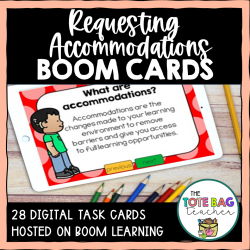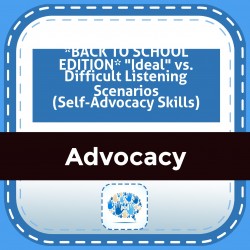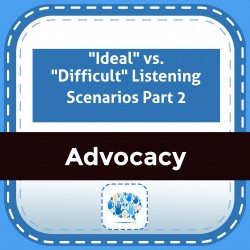Ability Levels
Categories
Resource Types
Age/Grade Range
CCSS
Anchor Standard
Speaking & Listening
Language
Reading
Requesting Accommodation Boom Cards
$ 5
Students who are deaf/hard of hearing must rely on accommodations in order to have full access to spoken language and learning within the classroom. But many times students don't know what accommodati
...
ons they need or how to request them. I created this deck of Boom Cards to help teach my deaf/hard of hearing students how to assert themselves and request their necessary accommodations. This deck features 28 cards total and are presented in a lesson format. There are 18 lesson cards and 10 self-checking checkpoint cards. Checkpoint cards are drag-and-drop and multiple-choice.This is a great deck to teach students what accommodations are, why they're important, and how to request accommodations (or how to remind a teacher who has forgotten to use them). This would be perfect as a guided lesson during one-on-one sessions with your students, or as an independent review. Please note: The first 2 interactive cards (cards 3 and 6) and are based on each student's unique circumstances; therefore there is no "right" answer. After selecting responses on these 2 cards, DO NOT hit submit or they will be marked as wrong. Simply select responses on these first 2 cards and click NEXT.
*BACK TO SCHOOL EDITION* "Ideal" vs. Difficult Listening Scenarios (Self-Advocacy Skills)
$ 375
This resource contains 15 possible listening situations for DHH learners. Read each scenario and have your student decide if this is an "ideal" listening situation or a "difficult" listening situation
...
Self-Advocacy: End of the Year Paired Reflections for Student and DHH Teacher
$ 2
This no-prep activity is ideal to use at the end of the school year with your deaf or hard-of-hearing students. Use this resource as an opportunity to reflect on the school year, your student's growth
...
and needs, and your own growth and needs as a teacher as well. Having an open dialogue with your student using these guiding questions will help you to understand how you can further support them as a Teacher of the Deaf and Hard-of-Hearing.This resource contains a reflection pages students to complete, a reflection page for teachers to complete, and a supports page for both to complete together.
"Ideal" vs. "Difficult" Listening Scenarios Part 2
$ 375
This product contains 15 self-advocacy scenarios for geared to help deaf and hard-of-hearing students. There are both "ideal" listening situations and "difficult" listening situations included in orde
...
r to help students develop self-advocacy and problem solving skills.Read each scenario and ask your student to determine if is an "ideal" listening situation or a "difficult" listening situation. If it is a difficult situation, what can be done to fix it?This product is best used with students who are in upper elementary grades and up. It contains both school-based and community-based scenarios.
Student Friendly Adapted SEAM
$ 7
The ADAPTED SEAM uses student-friendly language that activates self-reflective skills, encourages student ownership, and provides an interactive/conversation starter when done with the student. Some s
...
tudents experience an "ah-ha moment" about their responsibility the first time they complete the chart.
Ways To Use This:Discussion tool while completing the data form with your student. Self-reflection tool for older students while providing data for you.Assessment tool for determining self-advocacy present levels. (sample write-up included)Baseline data for your measurable IEP goal. (sample goal included)Students To Use This With?A student who is missing many of these skills at their levelsA student who is NEW to hearing devices regardless of age. An older student needing frequent reminders of these skills can benefit from revisiting the form periodically to track their progress.Why Use this?Editable PDF or Printable (2 versions)Timely benchmarks for progress reportingEasily Attach/Upload to IEP SystemsSample Assessment/Present Level Write-Up provided Sample IEP Goal & Completed Student Example providedWhat's Included in this Adapted SEAM Product?Overview of All Adapted Levels At a Glance (1 page) Directions and Ways To UseEditable PDFs - compact, single-page view. (7 forms/levels: Pre-K, K, 1st-2nd, 3rd, 4th, 5th, MS/HS)Printable Forms - expanded onto 2 sides for reading and writing ease. (7 forms/levels: Pre-K, K, 1st-2nd, 3rd, 4th, 5th, MS/HS)Student Data Example Sample Assessment/Present Levels Write-UpSample IEP goalSample - Real Student Form Completed over an IEP year.
Beyond the Sky’s Limit -PPT
$ 3
NOTE: Powerpoint Presentation for viewing on PCA collection of comic strips revealing troublesome situations for teens with hearing loss. Includes commentary on how each humorous situation might be re
...
resolved.20 more situations and scenarios that mix humor with compassion in negotiating social communication.More antics and advocacy for teens and tweens with hearing loss.
Self Advocacy Scenarios TURNING LEMONS INTO LEMONADE
$ 7
20 Real-Life Scenarios portray common situations encountered by school-aged children who are deaf and hard of hearing. They are derived from true stories I have heard from children over the
...
years. The scenarios are of real photos that elicit language and engagement.Discussion prompts are included with each scenario and include guidance for the therapist, teacher or parent to incorporate when leading the discussions. The scenarios foster problem solving and brainstorming for possible solutions for each difficult communication situation.When Life Gives You Lemons, Make Lemonade - While the theme is lemons the scenarios are common listening situations where problems may occur due to the setting, the listener or the person talking.A scaffolding strategy, I find successful when introducing self-advocacy begins with an experiential language activity of making homemade lemonade. This rich experience sets a foundation for an ongoing series of lessons on self-advocacy and the premise of this resource. Children in my practice learn early, they are the boss of their hearing loss. Sometimes life hands them sour lemons but they can choose to turn those lemons into sweet lemonade.Digital - No PrintInteractive PDF with clickable buttons to navigate between pages.Teletherapy and as no print in face-to-face lessons/sessions.Read more on the HearSayLW blog. Any questions? I'm a great listener.◈ ◈ ◈ ◈ ◈ ◈ ◈ ◈ ◈ ◈ ◈ ◈ ◈ ◈ ◈ ◈ ◈ ◈ ◈ ◈ ◈ ◈ ◈ ◈ ◈ ◈ ◈ ◈ ◈ ◈ ◈ ◈ ◈ ◈CUSTOMER TIPS:➼ Questions? Feel free to email me before purchasing this resource or anytime later. ➼ Sign-up HERE for the Listen With Lynn NewsletterLet’s Connect:InstagramFacebookKeep up your good work. I am blessed to help along the way. Thanks so much! Lynn
 Your browser is out of date. For best experience switch to latest updated Browser.
Your browser is out of date. For best experience switch to latest updated Browser.
 Get Chrome
Get Chrome Get Edge
Get Edge Get Firefox
Get Firefox






